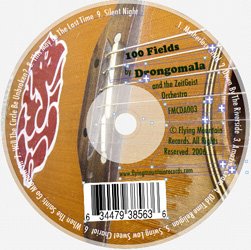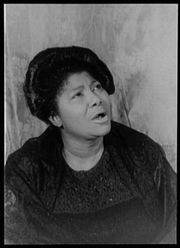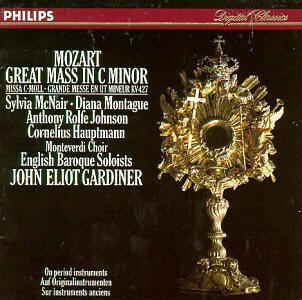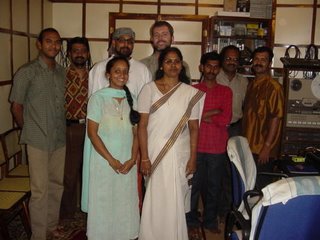
100 Fields
If ever I did a Zeitgeist Orchestra recording without knowing it fully at the time then it was definitely ‘100 Fields’. This record is now available (hear some) but here’s my story of where, who, what and why…
Somehow, somewhere I was drawn to black gospel music as manifest in America during a time where the tension was pulled tightest. I was drawn to the female gospel singers in particular – Mahalia Jackson, Sister Rosetta Tharpe, Mavis Staples and Aretha Franklin. It seemed to me that the solo singing was best done by the women and the harmony singing by the men and I’ve often wondered why that dynamic prevailed. My end thinking was that the women felt the blues double because they had two oppressors (albeit of a different nature) – whites and the chauvinisms of their own black men. When the women screamed about pain I’m guessing the men shut up. It's how I feel about what I hear. If you listen to some of those recordings by the great women in gospel they carry an authority that is very difficult for the men to match. Sister Rosetta Tharpe, for example, played electric guitar in a wild syncopated style long before Hendrix plugged in and she was Little Richards childhood idol. Not to mention her singing which had the chime of the dawn of time written all over it.
It seemed to me that the solo singing was best done by the women and the harmony singing by the men and I’ve often wondered why that dynamic prevailed. My end thinking was that the women felt the blues double because they had two oppressors (albeit of a different nature) – whites and the chauvinisms of their own black men. When the women screamed about pain I’m guessing the men shut up. It's how I feel about what I hear. If you listen to some of those recordings by the great women in gospel they carry an authority that is very difficult for the men to match. Sister Rosetta Tharpe, for example, played electric guitar in a wild syncopated style long before Hendrix plugged in and she was Little Richards childhood idol. Not to mention her singing which had the chime of the dawn of time written all over it.
Check out her version of Down By The Riverside
I think I’m in awe of how the souls of black women were stretched during their horrible struggle in America – they sung like broken and beautiful birds and it’s just by luck that recording techniques were around to grasp one aspect of it. The music in Scottish and Irish churches can be a real dirge…the reasons for this are complicated and possibly something to do with the weather and fields long since being settled but the singing in the Northern churches of the globe doesn’t feel like it’s made from cosmic stuff at all.
The music in Scottish and Irish churches can be a real dirge…the reasons for this are complicated and possibly something to do with the weather and fields long since being settled but the singing in the Northern churches of the globe doesn’t feel like it’s made from cosmic stuff at all.
I was brought up in one of these kind of churches but because I loved music so much it became more difficult to connect the church with the magical and wonderous when the arts going inside were so leaden. I liked the long quiet bits with no singing where you could just lose yourself in your own thoughts. Church became boring for me and when I could I escaped it. I didn’t give up on it and music though and I looked to gospel music.
I worked back from Arethea Frankin and luckily I could see past the sound quality of some of the earliest works of Mahalia around the 1930’s. I was in a rock band at the time and it felt like no-one was screaming it out like these female gospel singers did way back. I sang along to their songs a lot. I didn't believe in the church that I'd been to but I believed in Mahalia's singing 100% and that felt like religion to me. Since then I have a few other veins of devotional music that really do seem to touch on the sacred or the timeless for me. Mozart’s Requiem Masses, the Bulgarian folk laments, Indian devotional recordings. I often thought that these musics contained more of God than those somber Sunday masses.
Since then I have a few other veins of devotional music that really do seem to touch on the sacred or the timeless for me. Mozart’s Requiem Masses, the Bulgarian folk laments, Indian devotional recordings. I often thought that these musics contained more of God than those somber Sunday masses.
Fast forward to my last days in India 2002 and I somehow decide to do some of my favourite gospel songs with a south Indian folk band - as a way to clear my head after the orchestrally demanding Scale. I don't consider myself to be a Christian or of any religion at this point in my life. In sync with me leaving India more than a year on since the 9/11 tragedies the landscape of the world was teetering with a divisive east west mentality. I still gave a shit about right and wrong however. I had an hours rehearsal with the singers beforehand and then we did the record live in no more than 2 takes for each song. The recording was a wonderful magical thing and we all felt it in the room. Nearly all the denominations (athiests and 'music'ists included) were present by accident rather than design and the message is in the act of doing it in the first place. My frantic arrangements the night before worked and the musicians played with such soul that were were blessed no matter which lexicon you use.
The recording was a wonderful magical thing and we all felt it in the room. Nearly all the denominations (athiests and 'music'ists included) were present by accident rather than design and the message is in the act of doing it in the first place. My frantic arrangements the night before worked and the musicians played with such soul that were were blessed no matter which lexicon you use.
I felt lucky that the thing even happened at all.
Now I'm putting it out and want to tour it. So naturally I've just had a quick look at the 'market'. Here's an example of one market (US Gospel) that this record will be thrust into and in truth it is in all and none of them. Anyways...
Gospel stations in america fall into three categrories...
- southern only i.e. black only,
- mixed meaning the country white style and the south style
- those that are a little more loose with a definition of Christianity
I want the debate and I'll be having it soon. Get on board. John Lennon isn't around so we need you.
I hope you enjoy it.
We hope to do a live concert in Wales using a Welsh Choir and Indian musicians conducted by Drongomala aka me during Nov 2006 - keep an eye on the website.
MORE INFORMATION AND BUY LINKS
100 Fields WebSite on Flying Mountain Records
100 Fields CD Baby Buy Link
100 Fields MySpace Site
Drongomala
www.drongomala.com
p.s. any animators want to have a pop at a video for one of the songs?




No comments:
Post a Comment